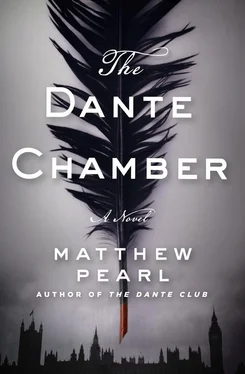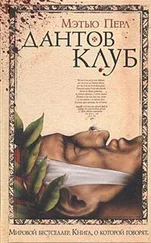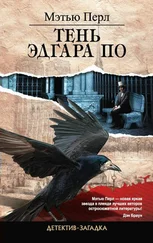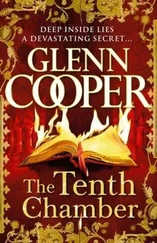Browning was far more comfortable attending a London memorial for Morton, though there wasn’t much of interest to observe there (other than the conspicuous, slouching figure of their friend-rival-paragon Tennyson among those attending). There was a memorial prayer service for Miss Brenner at a small church that Christina had attended in the past, so she went there to hear more details about the opera singer: her dreams as a small child of singing for the public, her rigorous training by her father, her quick rise to prominence because of the immense compass of her voice, even if it lacked the flexibility of the best soloists. They secured seats for the benefit opera performance of Fidelio . Christina insisted on purchasing a seat in the stalls for herself, not in one of the frightfully expensive six-guinea private boxes where Holmes and Browning would be. They would not sit together, but of course that was part of their plan.
Browning’s plan. He thought that by attending the opera separately they increased the probability of overhearing information from other audience members who knew Miss Brenner. Christina had been less than pleased with the entire visit to the opera house, but agreed it was a necessity. Although she enjoyed operas and plays in her youth, she long ago swore never to attend them because their dramatized stories were so often vulgar, if not utterly impious and unchristian. Christina followed the same practice with reading books, as a result almost entirely swearing off modern novels and, until the recent events, most newspapers. Look elsewhere for news , she would tell family members, but not to me . When it came to operas, the actresses and singers and musicians all had reputations for what Christina would kindly call moral agnosticism.
Charles Cayley, during the years when studying under the professore brought him to the Rossetti home, had once laughed to Christina about her managing not to notice the existence of anything improper in a place like London. “How I wish,” the translator said in a state of sudden reflection, “I could see through such innocent eyes.”
Part of the purpose of their expeditions to memorials and to the Haymarket Opera House was to identify any person Morton and Brenner might have known in common with Gabriel — someone who might have been involved in their disappearances who was also in a position to have known and taken Gabriel.
They continued to prepare and study their notes. For hours at a time Holmes — as though delivering one of the famous medical lectures Christina had heard about over the years — narrated more details about the murders that shocked Boston. Christina and her accomplices faced a disadvantage in trying to trace the influence of Dante around London compared to that surmounted by Holmes and his Dantean friends. Boston in 1865 had been a time and place when almost nobody had knowledge about Dante or the Divine Comedy . Now that Longfellow’s translation of Dante had been widely published on both sides of the Atlantic, competing translations multiplied. With Dante so fashionable, they could not limit their suspicions to those who were so-called true Danteans. Holmes, in telling his tales, pointed out some of the key lessons they’d observed in Boston. One of these was the special appeal to the eye and mind of a soldier in the way Dante organized the world in pursuit of rightness and justice. Dante also had been a soldier in his youth, and since the beginning of human history the soldier and the poet had shared great (or terrible) imaginations that remade their surroundings.
The words poured forth from the doctor’s mouth whenever he worked up steam on a story, but in talking about the Dantesque occurrences in Boston, there was something more than his ever-present energy and momentum of narrative; there was relief. He had liberated a part of his history that had festered by being locked inside him. There was also a degree of pride in what he and his friends accomplished.
“After all,” Holmes tried to explain, realizing this pridefulness had been revealed by his tone, “Dante could have been blemished for ages if not for our clandestine intervention.”
“With due respect, Dr. Holmes, what I care about, all I care about, is the safety of my brother,” said Christina. “I wish to make it very plain that the integrity of Dante Alighieri does not concern me.”
Holmes hung his head a little and apologized with a nod.
She did not mean to dismiss the importance of protecting literature from being perverted through violence. Dante, after all, buoyed her father to his dying day, and had inspired her siblings and herself — but this was the problem. She had to employ her expertise without getting sucked into the Dantesque vortex.
When the Rossetti family’s fortunes crumbled, it seemed to happen in a single moment, though it had been coming for a long time. As children, they were often surrounded by Italian refugees and exiles who came to their home for conversation with the professore (mostly in Italian, though sometimes slipping into French) and to share the little food the family had. The professore said most of these callers were either cercatori or seccatori , the begging or the boring. But sometimes they were revolutionaries, conspirators, even assassins. Young Gabriel would stop his sketching or his dominoes to listen carefully to these stories of overthrowing corrupt rulers in the name of liberty. The boundary between being an exile and being mad seemed to be a fine one, convincing Christina that losing one’s rightful place in the world could mean losing one’s mind.
There was a man named Fiorenzo Galli, to take one example, who sat in their house giving a very careful speech to prove he was Jesus Christ. Then there was Signor Galanti, who offered predictions of disasters to come, claiming first would start the Age of Roses and Thorns, then the Age of All Thorns, then the Age of Death. When the professore dismissed Galanti as a bird of ill omen, the visitor rose, crying, “You will see one day, Rossetti, whether I speak the truth, and you will confess it, but I will not await the direful time that is coming upon us!”
Galanti then went to his house and slit his own throat.
The professore quietly carried around his own superstitions. In the Abruzzo region of Italy where he came from, stepping over a child was said to stop the child from growing. There were always children on the floor of the small Rossetti home — playing, drawing, writing verses and novels, and even compiling their own family magazine printed by their grandfather. There would sit the professore, in such a fury of work at his desk, but when he needed to retrieve a book, he would begin a slow, delicate dance across the combined study and drawing room to reach the shelf, ensuring that his shadow did not touch any of them.
Fewer refugees came over time — few visitors at all — as the professore began to conclude that a cabal of bloodsuckers around the world, including the novelist Victor Hugo, sabotaged his labors. He feared his own reflection in the mirrors, so Mrs. Rossetti took almost all of them out of the house. As Christina prepared maccheroni asciutti with Parmesan cheese and butter for the family, she overheard the professore confiding to her mother: “Whether Neptune or Vulcan devour my vigils, I shall not see it, I shall not suffer.” Meaning, in his dramatic language, his work would end up at the bottom of the sea or in ashes. And another outburst another time: “My own shadow terrifies me, Francesca! I have become like one of those people of exaggerated piety who think that in their most insignificant action they have committed a mortal sin.”
Maybe they had entered Signor Galanti’s Age of All Thorns.
As the professore continued to spend more time working on Dante in solitude, his eyes and health worsened. He had nightmares if he could sleep at all. He was forced to resign from the university, where there were fewer students who wished to study. (When Queen Victoria married a German, studying German became all the fashion, leaving Italian further behind.) In his best year the professore made no more than ten pounds, which they kept in a box in the house, never having enough to open a bank account. A few loyal pupils like Cayley continued to engage him as a private tutor of Dante and Italian, mostly as an excuse to help the struggling Rossettis. The family was left with little money and no expectations of future income. What the professore did next amazed everyone: he kept working on his Dante. He would spend the rest of his life, if necessary, but swore he’d finish his Dantean labors.
Читать дальше












